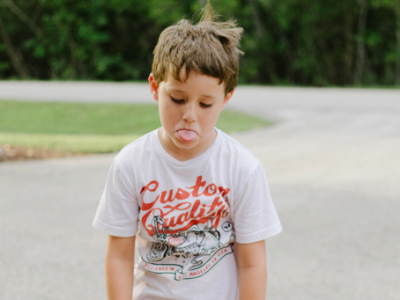
Why I don’t want our children to be (just) happy
Harriet Connor explores what God's word has to say about happiness and how this influences our aims in parenting
A visitor to the modern West would have good reason to believe that the goal we are striving for in life is happiness. Our guiding principle seems to be: ‘Do whatever makes you happy; follow your heart’. We are on a constant quest to find our ‘happily ever after’ with the perfect partner, the perfect body, the perfect job, and the perfect house.
This filters down to our parenting, too. If you ask modern parents what we want for our children, we reply in unison: ‘We just want them to be happy!’ We end up doing everything we can to give our kids a perfect childhood of perpetual delight.
My first years of motherhood were like that—I was completely preoccupied with our son’s emotions. Of course, parenting a newborn is about making sure your baby never has a reason to cry—we rightly devote ourselves to meeting their needs. But my problem was that as our baby became a toddler, I continued to court his happiness above everything. I fretted, I flitted, I hovered—trying to protect him and his feelings from ever getting hurt.
Then one day, I was standing in the kitchen when the realisation hit me: at some point, I would have to make our son cry. I asked myself the ridiculous hypothetical question: What if our son wanted to play with that knife? In order to keep him safe, I would have to say ‘no’, regardless of how that made him feel.
I was rattled. If our son’s happiness was not a sustainable aim for my parenting, then what was? That burning question drove me back to God’s word, which I consumed from cover to cover over the course of a year. Re-reading the Bible as a confused young mother lifted my eyes to see the bigger picture of what parenthood is really all about.
Now, seven years and two more sons later, I really don’t ‘just want our children to be happy’. Here’s why:
1. Chasing happiness doesn’t work—it’s a by-product, not a goal
The first problem is that the more we chase happiness, the less we find it. In spite of our society’s obsession with happiness, rates of depression and mental illness have never been higher. This is afflicting both adults and children. The first generation of ‘just happy’ children are now hitting adulthood and they are really struggling. Many of them lack the skills to cope with the disappointments and setbacks of life in the real world.
The experts are warning that simply chasing good feelings and running away from bad ones does not add up to a happy life. Happiness is only ever a by-product of pursuing something beyond ourselves. Psychologist Russ Harris writes:
‘When we clarify what we stand for in life and act accordingly, then our lives become rich and full and meaningful, and we experience a powerful sense of vitality. This is not some fleeting feeling—it is a profound sense of a life well lived. And although such a life will undoubtedly give us many pleasurable feelings, it will also give us uncomfortable ones, such as sadness, fear and anger. This is only to be expected. If we live a full life, we will feel the full range of human emotions’. (Harris, The Happiness Trap, p.15)
According to the experts, the key to a meaningful life is connection—to others, and to a higher purpose in life. As humans, we need to know that we are part of something bigger.
2. We were created for more than happiness
When I turned to the Bible for guidance, I realised that it had been saying the same thing all along: human beings were made for much more than the pursuit of happy feelings. We were made for the higher purpose of connection to God, creation, and other people.
First of all, we are created for connection to the God who made us. In the beginning, God gave humanity the unique honour of being made in his own image. We were made for the purpose of honouring our Maker by reflecting his character and values in the world.
Secondly, humans were made for connection to God’s creation. God assigned human beings the responsibility of being stewards over his creation—we were made to work and take care of the world we live in.
Thirdly, we were created for connection to one another. God created humanity as male and female—the human race is a community of diverse individuals, tasked with honouring God and working his creation together. Our purpose is to do good to the people around us, because they also bear the image of God, our Maker.
If humans were made for more than happiness, then parenting must be about more than simply making our children feel good. Parenting is about helping our children to know and live out their big, God-given purpose, in connection with God, creation, and other people.
3. Hard things help our children grow
When we make our children’s happiness our primary aim, we end up trying to protect them from any slight difficulty or disappointment. But a trouble-free childhood actually stunts our children’s growth—‘just happy’ children struggle as adults because they haven’t had the chance to practice resilience.
By contrast, the Bible prioritises the development of a godly character and godly values over happiness or comfort. The whole project of teaching our children to honour God, live well in his creation, and do good to others—is summarised by the word ‘discipline’:
‘Our fathers disciplined us for a little while as they thought best; but God disciplines us for our good, that we may share in his holiness. No discipline seems pleasant at the time, but painful. Later on, however, it produces a harvest of righteousness and peace for those who have been trained by it’. (Hebrews 12:10–11)
Hardship can be a powerful tool in our parenting. Our job is not to steer our children around difficulties, but to walk alongside them through it all. When we purposely allow our children to experience small doses of hard things—disappointment, frustration, boredom, delay—we are helping them to develop their resilience to these things in later life.
When we stop overprescribing the drug of instant happiness, it gives our children the chance to strengthen their immunity to hardship for life.
As for me, I no longer ‘just want our children to be happy’—I want so much more for them. I want our children live a meaningful, purposeful life, in connection with God, creation and other people. I want to let our children experience both happy times and hard times so that they develop resilience for life in the real world.
And if the experts are right, taking my focus off our children’s happiness will—ironically—set them on the path most likely to lead to a truly satisfying life.
Harriet Connor lives on the Central Coast of NSW with her husband and three sons. She is the author of Big Picture Parents: Ancient Wisdom for Modern Life. Find out more at www.harrietconnor.com.
Harris, R. 2008, The Happiness Trap, Robinson, London
For more articles from Growing Faith, subscribe to our monthly e-newsletter.
To hear about the latest books and resources from Youthworks Media, subscribe here.






